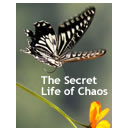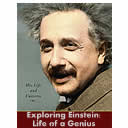Let There Be Life
Quantum physics, the field of science that studies the unpredictable behavior of subatomic particles, could hold the answers to many of life's most confounding secrets. So says noted physicist Professor Jim Al-Khalili. As host of the intriguing documentary Let There Be Life, Al-Khalili exits the sterile and highly controlled laboratory environment to test the validity of quantum physics in the natural world.
How can this field of science clarify our approach to the biological processes that have long mystified us? The film begins by studying the unusual migration pattern of the Quantum Robin, a distinguished species of bird that travels from Europe to the tip of Spain and back again ever year. The bird seems to use the Earth's barely perceptible magnetic field as its navigational guide. The filmmakers test this possibility by tracing the process of quantum physics in the cells of the bird's eye.
Elsewhere in the film, we learn how this science might deepen our understanding of how our sense of smell can distinguish between various scents. The filmmakers probe the role of quantum physics in the process of evolution, specifically as it relates to the tadpole that becomes a frog. How is this process possible in just a few short weeks?
The results of these experiments and others are surprising, definitive and deliciously weird.
Early on in Let There Be Life, viewers are provided a good primer on the definition of quantum physics, which makes the latter segments of the film much easier to digest. We hear of Einstein's distaste for a realm of thinking that favored the whims of chance over scientific certainty. Einstein claimed that he had uncovered a flaw in quantum physics, and Al-Khalili conducts his own experiment to test the legitimacy of this claim.
We also learn the key characteristics of the Uncertainty Principle, the theory which contends that the precise positioning and speed of a moving object cannot be adequately measured, and how it factors into the process of photosynthesis.
Engaging and amiable, Al-Khalili excels as our guide through this world of complex science; his enthusiasm proves more than infectious and makes us eager to learn more about the secret life of quantum physics.
Directed by: Kenny Scott




One thing I've learned from science is that scientists aren't funny. lol
It is kind of a pity that such magnificent stuff in nature does not lead to the conclusion of Intelligent Design. How can one state that 'there is no doubt that Darwin's theory accounts for every living organism', when he has just found out that nature is so incomprehensibly complex and beautiful?
Interesting stuff, but does any of it have a practical, useful application?
Which brings to mind the observation that "knowledge may increase power but seldom brings with it happiness".
These violent and disturbing times seem to support that hypothesis in this age of great technological-scientific advancement.
If some knowledge is impossible, some reality unknowable, e.g., "unpredictable behavior of subatomic particles", how could we "know" it? How could we "know the unknowable"? Isn't this a contradiction and therefore impossible? In the beginning, most behaviors were unpredicted. That doesn't prove they are "unpredictable". We have the known and the unknown, but the unknowable is not possible.
No experiments are needed to disprove quantum physics. Just define "chance", i.e., "whims of chance". When we don't understand, we say "It happened by chance", i.e., "I don't know why it happened". Ignorance is not a metaphysical statement, it's an epistemological statement, i.e., a knowledge statement. Our knowledge doesn't create reality, it discovers it, identifies it. Reality is, regardless of our knowledge. We don't "imagine" reality into being. The statement, "Everything is possible" means "nothing is possible" because "possible" only has meaning if the "impossible" exists, e.g., we can't be correct if we can't be wrong. All sensations exist. What they mean needs to be found out. That is not subjective, open to any meaning we want. It is objective, provable scientifically.
Not sure why "quantum mechanics" was necessary to explain "vibrative" olfaction.